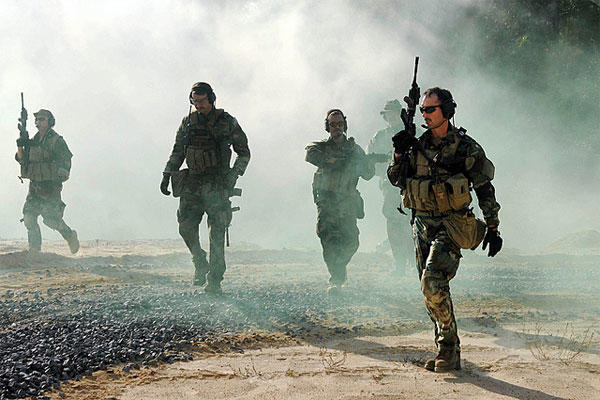Members of Congress questioned Special Operations Command leaders today about reported equipment shortages in some elite units that extend as far as not having enough individual weapons to go around.
Rep. Duncan Hunter, R-California, raised the issue with U.S. SOCOM Commander Gen. Joseph L. Votel at a March 1, hearing for the House Armed Service Committee's subcommittee on Emerging threats and Capabilities.
"I have had multiple SEALS, multiple times come to me in the last six months come to me in San Diego and tell me how things have changed dramatically from five or six years ago meaning they don't get weapons to work up with for two years," Hunter said.
"They get their weapon when a guy comes back and hands over the weapon; then they have to recalibrate it, put on all their optics, all their laser stuff for themselves and then they have to turn that weapon back in again even if they are still in work ups and are going to deploy nine months later. They still have to give the weapon up to the next guy going out. It wasn't like that in the 2001 to 2010 time frame."
Hunter asked Votel if we was aware of the problem, adding that "I would say the operators get tons of stuff, but the most important thing is their weapon that is what you kill people with and things have changed."
Votel told Hunter that he was "aware of your recent correspondence with Naval Special Warfare Command over this particular issue. I would just add that ... these guys put a lot of rounds through their weapons.
"What we do try to do is ensure that with that many rounds going through our weapons that they have the right level of depot maintenance on them when they come back from deployments or long training periods."
Hunter responded by saying "this is not a factor of too many rounds going through the weapon. That is not the problem."
The issue at the hearing surfaced on the heels Feb. 26 Stars and Stripes story that details similar equipment shortages in SOF units.
Elite troops such as the SEALs are more and more forced to dip into their own pockets to purchase basic military gear such as helmets, global positioning devices and medical supplies. House lawmakers have taken notice and said they will request an explanation from Defense Secretary Ash Carter.
Votel attempted to reassure lawmakers that he would look into the issue.
"Congressman I look forward to talking with Navel Special Warfare Command on this specific issue and making sure that we understand it and if there is something that we are contributing to that is impacting readiness of our operators, we will certainly take action to rectify that," he said.
Hunter asked Votel what his priorities are for the SEALS.
"If it isn't having a weapon that stays with you during your deployable term then what are the priorities?" Hunter asked. "Do we have more SEALS now? Do we have more Special Forces? We increased manpower and that is where the money is going as opposed to weaponry?"
The special-ops community has grown considerably over the last decade to roughly twice the size it was, Votel said.
Votel said he provides broad capabilities planning guidance commanders on an annual basis.
"I don't get down into the specifics of individual weapons or that type of stuff, but what I do try to do is focus them on the priorities that I have," Votel said, adding that "first and foremost, it would be readiness."
Numerous individual instances point to a systemic problem in the military's supply chain, but a blind spot exists between Defense Department vendors and the troops who need the gear and supplies, Hunter said in the Stripes article.
-- Matthew Cox can be reached at matthew.cox@military.com





























